'Clean and safe' for who? Asheville council hears anxieties around proposed BID
ASHEVILLE - From her home on Church Street, Susan Griffin has watched the movement of downtown for 20 years. She was a fierce proponent of a Business Improvement District in 2012, and was subsequently appointed co-chair of its committee.
Though the district was created, the effort eventually stalled for lack of funding.
But on April 23, a decade later, Griffin stood in front of Asheville City Council urging them to say no to a newly proposed downtown BID effort — which she called “virtually identical” to the old pitch, without taking into account the significant changes undergone by Asheville’s central business district.
“It has too many unresolved and underdeveloped elements, too little real community input and a false sense of urgency to get it done,” she said. “A bad BID is worse than no BID at all.”
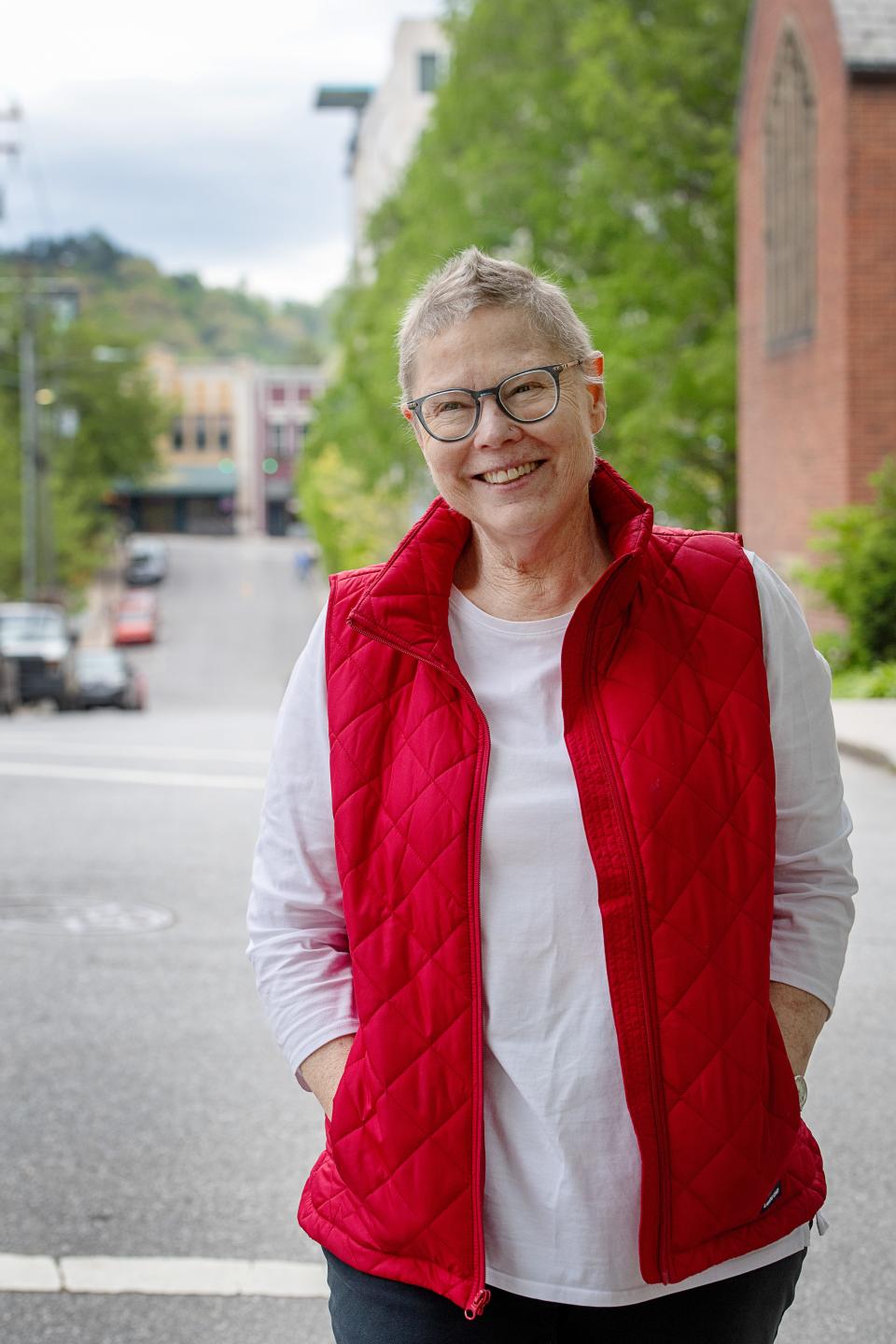
A Business Improvement District, or Municipal Service District, as it is defined by state statute, would leverage a special tax on property owners within a specific area to fund additional services or improvement projects.
It is not intended to replace city services, but to supplement them.
There are more than 60 BIDs in North Carolina, according to the latest data from the N.C. Department of Revenue, and more than 1,000 across the country. It's a common tool, N.C. Carolina Downtown Development Association executive director Jason Epley told the Citizen Times in April, with the ability to respond to a downtown's unique needs.
The BID proposal was brought by the Asheville Downtown Association and Chamber of Commerce. Two separate council votes are needed to establish a BID and set the tax rate — currently proposed at $0.0919 per $100 of assessed value. Votes are scheduled for May 14 and June 11.
The assessment would generate a $1.25 million operating budget. BID management is typically overseen by an outside organization. If approved, the Chamber and ADA plan to respond to the city’s request for proposals.
The budget outlined in the Chamber’s operational plan includes reimbursement to itself for the consultant it paid for a feasibility study: $200,000 over four years.
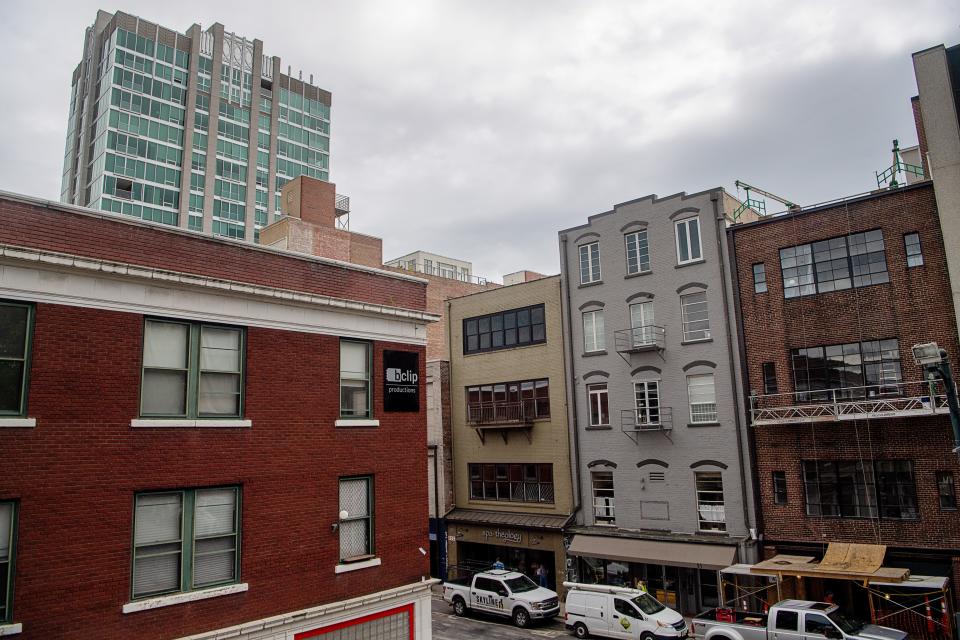
Clean for who? Safe for who?
Zach Wallace, vice president of public policy with the Chamber, said the BID effort is a response to concerns from community, to the many calls from downtown residents and business owners dealing with trash, with needles, “with any of the things that you could see outside your door.”
The conversation around a BID never stopped, he said, even when efforts faltered a decade before.
“We think of downtown Asheville as the economic heart of the region,” Wallace told the Citizen Times in an early April interview. “It’s an asset that has to be protected.”
“Clean and safe” is the slogan at the center of the Chamber’s proposal. It’s a familiar call of BIDs nationwide, proposing uniformed “hospitality ambassadors” — which it envisions as people in brightly colored polos patrolling downtown — and enhanced cleaning, like litter removal, street sweeping and pressure washing.
But some critics asked, “Clean for who? Safe for who?”
“I don’t believe they have everyone in mind when pitching a clean and safe downtown. I’m worried that it means cleansed of people they deem unworthy of taking up space, which usually points to marginalized communities,” said Madison Jane during the April 23 public comment period.

Other concerns surrounded further displacement of the city’s homeless populations, a rushed BID process, lack of input from the city’s workers and the blurring lines between public and private space.
Griffin said the city needed to bring its baseline services up — like a fully staffed police force and 24/7 community responders — before it could begin to supplement anything. She likened it to putting icing on a nonexistent cake.
“Without these core resources to call on, the ambassador program is just an expensive PR stunt,” she said. “It may fool tourists, but it’s not going to bring meaningful change to downtown residents and workers.”
Why now?
On April 23, Asheville City Council held its statutorily required public comment period in the banquet hall of Harrah’s Cherokee Center in downtown. Nearly 60 speakers signed up for a muddled and lengthy evening of input.
Hours of comment were preceded by back-and-forth from council over whether to cap the comment period at one hour, to limit speakers from three minutes to two, or when to even begin public comment, with contradictory start times complicating matters — while some audience members shouted their input up to the dais.
Many downtown residents, workers and business owners railed against the BID, among them leaders of Asheville Food and Beverage United. Though a majority of speakers spoke against it, more than a dozen people were firmly in support.
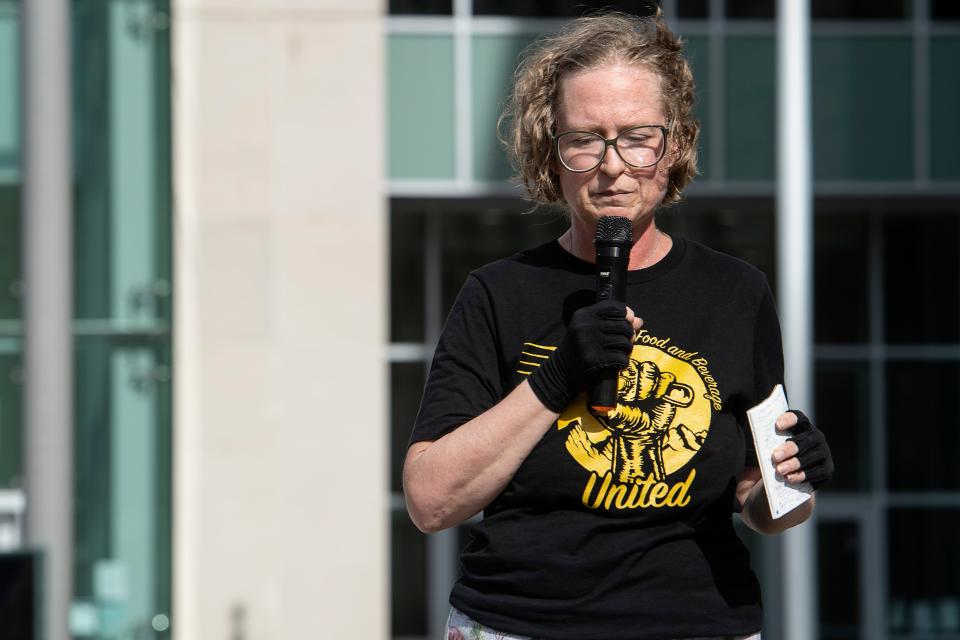
Eva-Michelle Spicer, fourth generation co-owner of downtown’s Spicer Greene Jewelers, said a BID was necessary to fill a “crucial gap.”
“Rather than stretch the city’s resources further, to the possible detriment of other neighborhoods,” she said the dedicated tax would provide “significantly expanded” services targeting downtown.
Spicer is one of 26 members of a BID steering committee, composed of downtown business and property owners.
The proposal “puts more eyes and ears on our sidewalks to make sure folks in need are not overlooked,” she said.
BID calls were amplified, and a feasibility study funded, in spring 2023, a time that also marked escalating outcry from downtown business owners around what many felt was increasing crime in downtown.
Asheville Police Department crime data, presented in January, said citywide crime fell from 2022 to 2023, with violent crime seeing an 18% decrease and property crime down 13%.
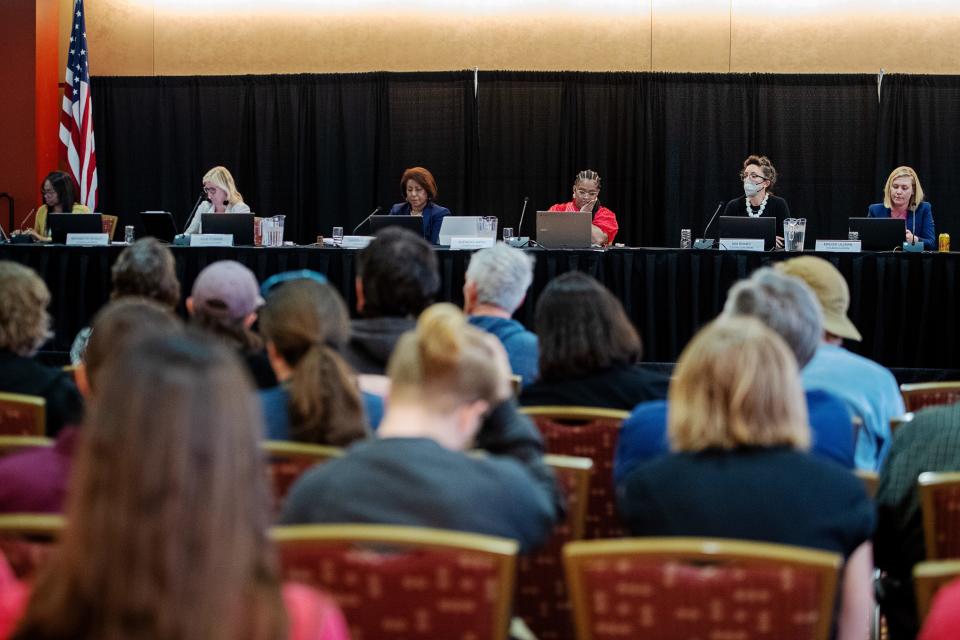
In an April 23 presentation to a council committee, APD reported numbers continue to drop, with citywide violent crime down 9% from Jan. 1 to March 31 compared to the same time last year, and property crime down 6%.
Heads of influential downtown organizations — like the Asheville Independent Restaurants Association and Asheville Buncombe Hotel Association — also voiced support for the BID.
JB McKibbon of McKibbon Hospitality, on the BID steering committee, said he represented the “largest property owner impacted by the BID,” with property spanning hotels, workforce housing, restaurants and other holdings.
He said people feel unsafe downtown and an additional presence is needed.
“I don’t think we need to overthink it. It’s focused on the basic necessities: clean and safe, and supplement the city’s resources on that endeavor,” McKibbon said.
How would this impact Asheville’s unhoused?
A central component of the proposed ambassador program, and an oft-repeated line from BID supporters, was that its team of workers would not only interface with visitors and businesses, but would engage “with members of the street and unhoused population,” directing them to “appropriate service providers.”
Some public commenters feared issues of safety were being conflated with the city’s unhoused population, or that ambassadors would not have the expertise to respond to people experiencing mental and behavioral health crises, or substance use disorder.
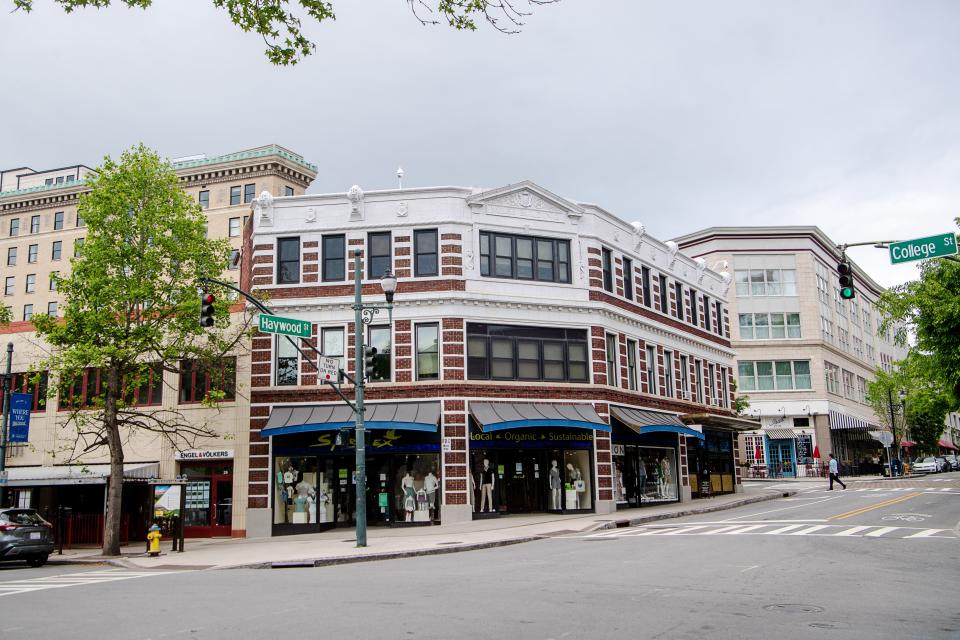
Erin Mastandrea, who said she works in homeless services, said “people are afraid, and they want to feel safe here, and when I hear that, and have been following that rhetoric, I think it’s focused on our houseless folks.”
“A BID is not going to solve the systemic issues that exist in this community,” she said, naming substance use disorder, a lack of affordable housing and mental health crises. “That is my fear. That this is some sort of Band-Aid that people that are feeling fearful want to just slap onto a situation that is exponentially complicated.”
“I don’t think we, or I, are trying to say that this is about homelessness,” Wallace said in an early April conversation with the Citizen Times. “Homelessness is a piece of what’s happening, but it’s more about the feeling of safety that folks feel is lacking in downtown.”
The hospitality ambassadors, as proposed, would not be armed or have enforcement power. He hoped the program would only strengthen other efforts, like the community paramedics, rather than work in competition.
Of the Asheville police reports of declining crime numbers, Wallace said: “For customers, either local, visitors, people from our broader region, perception is just as important as crime numbers. So if they feel unsafe, then they are not going to visit downtown, or our community at large.”
The hospitality ambassadors could be a tool to address that, he said.
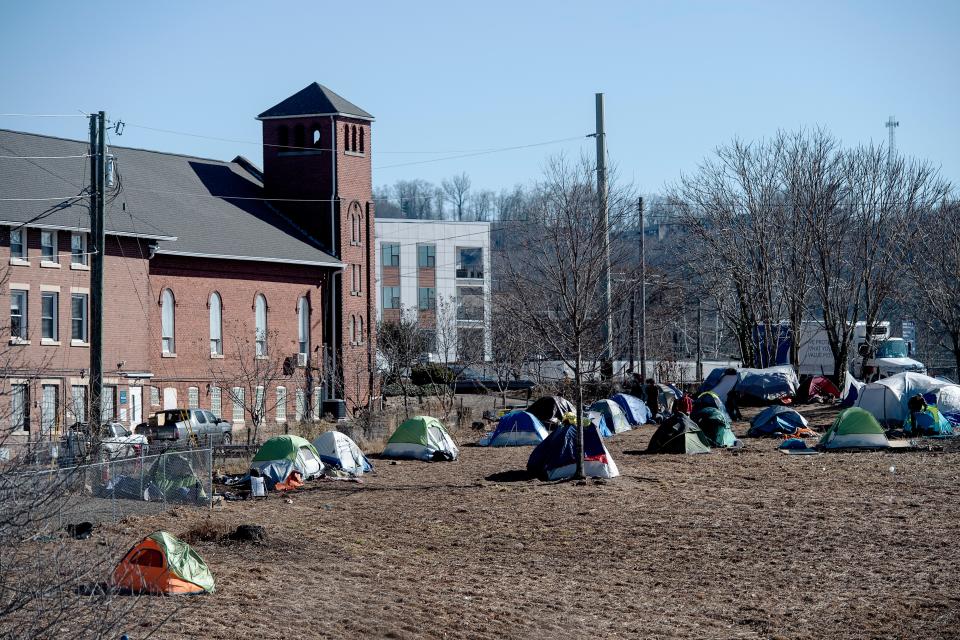
‘Those phone calls are already happening’
For some, the next step was simple: slow down.
Patrick Conant, director of Sunshine Labs, a local organization promoting open government and civic engagement, said it was time for the work to move into the public eye.
“We’re at the point now where the process needs to be opened,” Conant told the Citizen Times April 19.
The proposed board makeup, which would govern the BID, includes 15 seats: Three for major property owners (with commercial property with a combined taxable value of more than $1.5 million); two large property owners ($500,000-$1.5 million); two small property owners (less than $500,000), two residents; a resident tenant; a retail tenant; an office tenant; a food and beverage tenant; a “community council” representative and an at-large appointee.
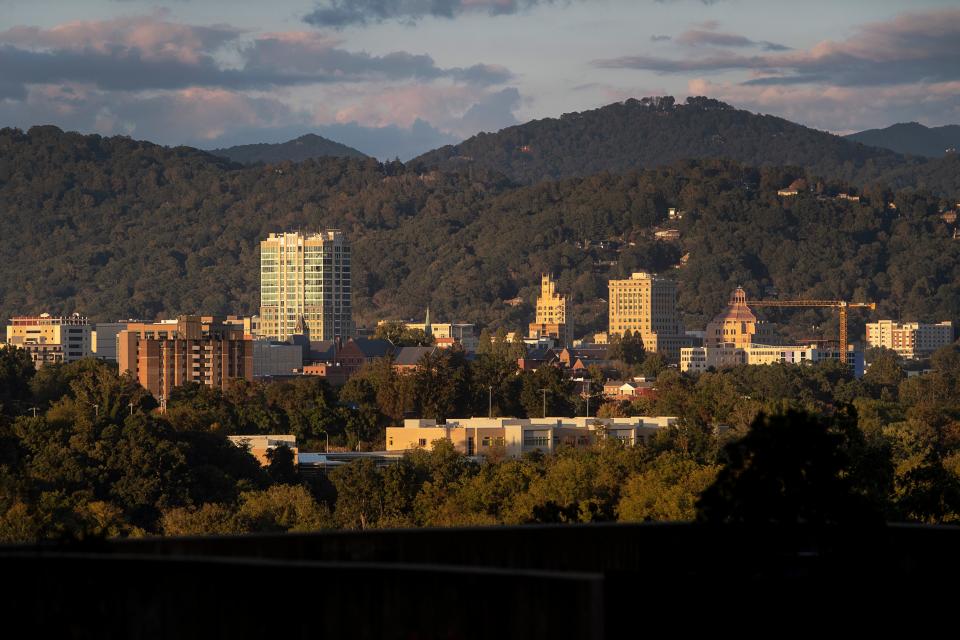
The non-voting seats include city and county managers (or designees) and a council member. There was originally an exclusive seat for the Tourism Development Authority, which was removed after public input, and a City Council seat added.
The BID would follow open meetings and public record law to ensure transparency, Spicer said. Each year City Council would approve the board of directors and the budget. The initial period for the proposed BID is 10 years, with a "significant review" at five years.
Per the city staff report, the initial decision by council will be limited to establishing the BID and setting the tax rate. The governance structure — around which many of the questions revolve — “will be determined at a later date, prior to the implementation of BID service delivery.”
While conditionally supportive of BIDs, Andrew Fletcher, former vice chair of the city’s Downtown Commission, who works downtown, said this proposal doesn’t have his support. It comes down to governance and board structure: local workers and renters should carry the most seats.
“While bills go to the property owners, the costs are passed to the tenants,” he said,
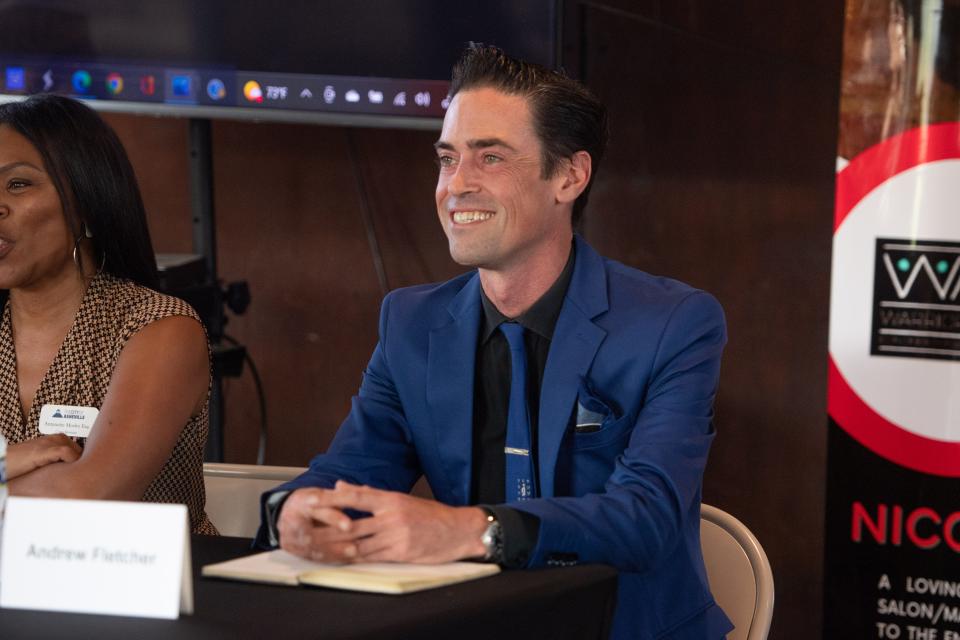
Clean and safe are services that should fall to the city, he said. Of the hospitality ambassadors, he said they’d be left with little to do but call the police or homeless services.
“Is it the people we need making the phone calls that we’re missing, or is it the people on the other end of those phone calls that we’re missing?” Fletcher said.
“When it comes to funding solutions, we don’t need more calls for service. We need more services.”
Griffin’s call was similar: “Send this back. Have really open sessions and input from people and fund it next year. If it’s good, it’s worth waiting for.”
More: Asheville Downtown Association pushes hard for Business Improvement District
More: Will East Asheville's Ramada remain housing for homeless after foreclosure?
More: After monthslong calls for Israel-Hamas ceasefire resolution, Asheville mayor responds
Sarah Honosky is the city government reporter for the Asheville Citizen Times, part of the USA TODAY Network. News Tips? Email [email protected] or message on Twitter at @slhonosky. Please support local, daily journalism with a subscription to the Citizen Times.
This article originally appeared on Asheville Citizen Times: Business Improvement District hotly contested at Asheville Council
